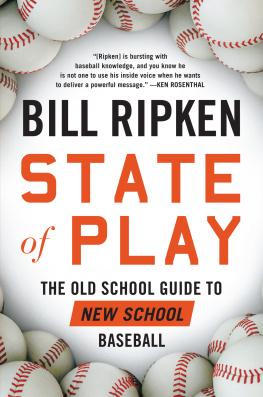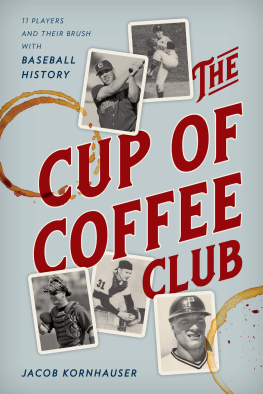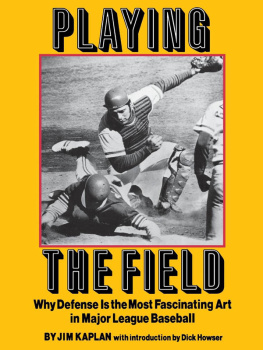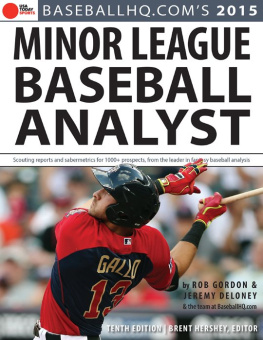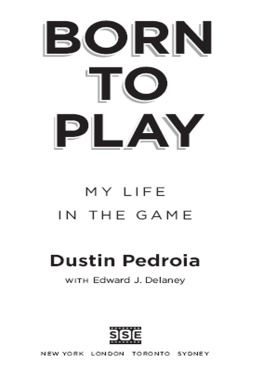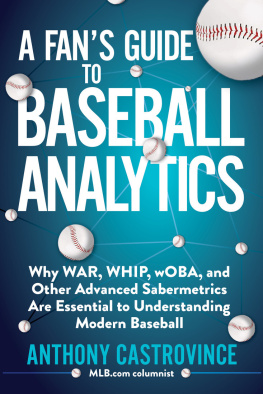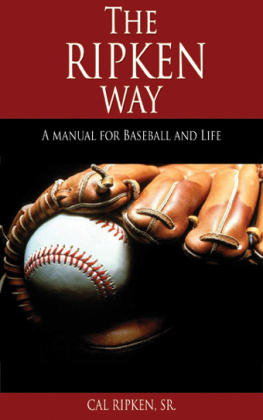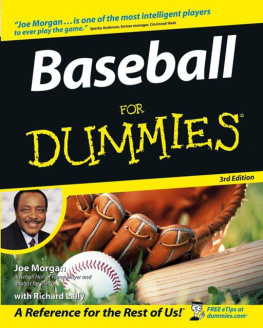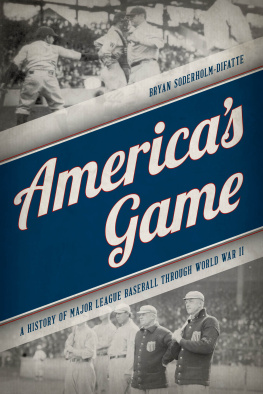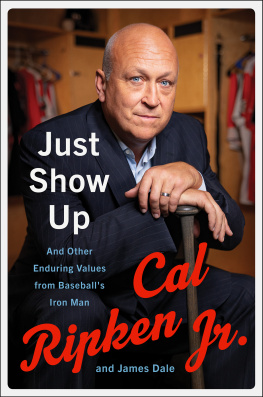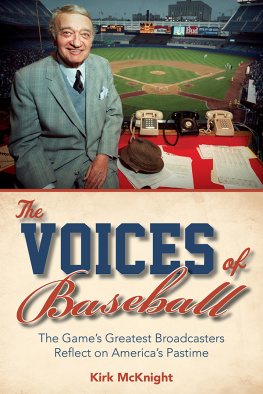

ALSO BY BILL RIPKEN:
Coaching Youth Baseball The Ripken Way
(with Cal Ripken Jr.)
Play Baseball The Ripken Way
(with Cal Ripken Jr.)

Copyright 2020 by Bill Ripken
All rights reserved, including the right to reproduce this book or portions thereof in any form whatsoever.
For more information, email
Diversion Books
A division of Diversion Publishing Corp.
443 Park Avenue South, suite 1004
New York, NY 10016
www.diversionbooks.com
Book design by Aubrey Khan, Neuwirth & Associates
First Diversion Books edition, February 2020
Hardcover ISBN: 978-1-63576-659-2
eBook ISBN: 978-1-63576-660-8
Printed in The United States of America
1 3 5 7 9 10 8 6 4 2
Library of Congress cataloging-in-publication data is available on file.
For my wife, Candace, and my kids, Miranda, Anna, Reese, and Jack. Everything I have become is because of you guys.
CONTENTS

FOREWORD
I dont recall exactly when the conversation took placeit was fifteen years ago, maybe more. At the time, many in baseball were dismissive of advanced statistical analysis. And while the analysts clearly had something to offer, their tone was often condescending and occasionally nasty, turning off many of us who otherwise were open to their ideas.
Around that time I became friendly with an analyst who was much more measured than many of his peers were. One day I asked him, Why are so many in the sabermetric community so hostile to those who do not embrace their arguments? I will never forget his response: Because when no one will listen, you have to shout to be heard.
All these years later, baseballs cultural war continues; only the power dynamic has reversed. Every team relies heavily on data, employing numerous analysts who influence both on- and off-field decisions. And now its members of what Bill Ripken calls the old schoolscouts, coaches, and executives with a more traditional bentwho struggle to be heard.
Until now, that is.
If you know Bill, you know he is a proud member of the old school. You know he is bursting with baseball knowledge. And you know he is not one to use his inside voice when he wants to deliver a powerful message.
Bill is a product of one of the games great baseball families, a former major league infielder who is now an Emmy Award winning studio analyst for MLB Network. His job at the network keeps him current with the games trends, but it doesnt mean he accepts them as gospel. In this book, he lays out his objections to a number of new practices. And as someone who talks daily with people in both camps, I can assure you he is not speaking only for himself.
I first met Bill in 1987, his rookie year with the Orioles and my first year as a baseball writer for the Baltimore (Evening) Sun . We didnt agree on everything when I covered him, and we dont agree on everything now. But as the son of Cal Ripken Sr., who spent thirty-six years in the Orioles organization as a player, coach, and manager, Bill grew up in the game and was good enough to play it at the highest level. His baseball IQ is such that many in the sport believe he would make a great major league coach. Yet too often today, baseball people like him are treated as if they have nothing to offer, despite their lifetime of experience in the game.
Virtually every team claims that it blends the old and new ways of thinking, using both subjective and objective information, valuing input from traditional scouts along with statistical analysts. With some clubs, those assertions ring true. With others, theyre lip service. Some in the new schoolboth members of the media and members of front officessimply are unwilling to explore the ideas Bill presents, treating them almost as threatening.
In this book, Bill writes, among other things, about all of the variables that might affect a players defensive rating. About why the path to a called strike is more nuanced than pitch-framing statistics indicate. About how a player such as Bills older brother, Cal Jr., was his own information bank, relying on his own wits to position himself instinctivelyand effectivelywithout the need for data-driven overshifting.
Bill doesnt have all the answers. No one in baseball does. But he is taking the same approach the new school analysts did as they rose to prominence, posing questions that challenge the games accepted doctrines. Only now, the accepted doctrines are the ones espoused by the new school, and some members of that school are as resistant to different ideas as the traditionalists once were.
A form of baseball dtente is necessary. The new schoolers need to listen to those who understand what it is like to play the game. The old schoolers need to accept that baseball has evolved. As I wrote recently for The Athletic , The sport isnt going back. It shouldnt go back. But the flexibility in thought the new school demandedthe relentless quest for knowledge that is the very basis of sabermetricsshould work both ways.
Thats all Bill is asking. Seems pretty reasonable to me.
Ken Rosenthal
MLB Network analyst
September 2019
INTRODUCTION
The way we talk about baseball has changed, but the game and the reasons for a players or teams success really havent changed all that much over the years. Baseball is still baseball and what has been done and worked for years is still being done and working in the game today. Thats old school. Those claiming that the game is completely different now are just making noise. Some things are different, sure, but they may not be as good as they once were. Take strikeouts. The rise of strikeouts to record levels over the past few years reflects a shift toward a philosophy in which an out is an out. Productive outs, battling with two strikes, and putting the ball in play have always been old school. And if the new and improved is neither new nor improved, we need to take a closer look.
This book isnt about what happens in any one season. These are my honest observations of what Ive seen in the game, both past and present, and what I believe will happen in the games future. If my theories and observations are sound as I continue to use baseball common sense as my guide, they will still ring true twenty years from now, or more.
Ive been in this game my entire life and I still love it. Thats why Im writing this book. My coaching experience, combined with what I learned playing the game and in my work for MLB Network has cemented my views on how the game is and should be played. In the twenty-plus years that I have spent coaching young players and teaching youth coaches as part of Ripken Baseball, Ive learned that the most complex situations are usually the product of simple things. A 6-4-3 double play at any level is a catch-throw-catch-throw-catch. Baseball isnt rocket science. Its a game that needs some thought, but not overthinking. Pitch the ball, catch the ball, and hit the ball better than the other team does and you win. Give me a starting pitcher who hands me a lead after seven innings and I like my chances in this game and the next one. Give me four infielders with average range and good hands who want to play 155-plus games a year, and Ill take my chances with them as well. Give me two guys who are beasts in the batters box so I can hit them third and fourth in my lineup, and Ill figure the rest out. If that sounds like an oversimplification, so be it. With so many trying to complicate the game today, fighting fire with fire makes sense to me.
Next page
